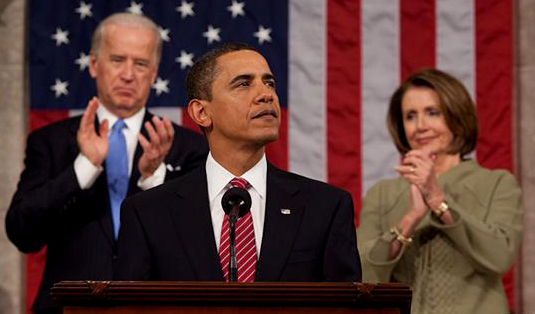
On January 20, 2009, Barack Obama was sworn in as the 44th President of the United States—the first African American to hold the office. His famous slogan, “Yes We Can,” spoke to voters across the country in a campaign built on ideals of hope, inclusion and change. As the Obama administration prepares to depart the White House this January, it leaves behind a nation transformed from its Bush-era self. Many will be sad to see it go.
An ex-University of Chicago law professor and Democratic Senator from Illinois, the 47-year old inherited a country broken by recession after the 2008 market crash. Over 8.7 million jobs were lost, unemployment peaked at a shocking 10% and the GDP contracted by 5.1% between 2008 and 2010. Obama rode a wave of Democratic victories, enjoying both a liberal House and Senate for the first two years of his term, though the Supreme Court was notably (and problematically) conservative. Within his first 100 days, Obama had passed an economic stimulus package in the form of his American Recovery and Reinvestment Act of 2009 and approved the expanded State Children’s Health Insurance Program. He also passed measures improving gender-equal pay in the workplace, reducing the influence of lobbyists in Washington and relaxing enforcement of marijuana laws. He continued the withdrawal of U.S. troops from Iraq, lifted the 7.5-year ban on federal funding for embryonic stem cell research and ordered the closure of the Guantanamo Bay detention camp (though this measure was unsuccessful). His approval ratings after these first hundred days was at 62%, showing broad support for early Obama action.
The accomplishments of the Obama administration are numerous and momentous; however, among the most notable is the ratification of Patient Protection and Affordable Care Act (otherwise known as Obamacare). Enacted on March 23, 2010, it was rapidly dubbed “the most significant regulatory overhaul of the U.S. healthcare system since the passage of Medicare and Medicaid in 1965” by the Washington Examiner. It intended to make healthcare accessible to all Americans by increasing the quality, availability and affordability of health insurance. The law requires insurers to accept all applicants, charging equal rates regardless of pre-existing conditions or sex. However, data points out that its effectiveness did vary based on each state’s ability to decide for or against expanding its previous Medicaid program – a Supreme Court mandate made the extension of Medicaid optional, and according to the New York Times, “states that chose to expand their programs saw much larger declines in their uninsured rates compared with those that didn’t.” The uninsured rate was almost cut in half from 15.7% uninsured down to 8.6%.
Internationally, the footprints left by the Obama administration are deep and abundant. On December 17, 2014, President Obama and Cuban President Raúl Castro simultaneously announced the beginning of a process to normalize US-Cuba relations. This marked a historic shift from the 54-year stretch of hostility; all diplomatic connections between the two nations were severed in 1961 as a result of Cuba’s close relationship with the USSR during the Cold War. In alignment with its commitment to averting further global nuclear proliferation, the Obama administration facilitated an agreement with Iran in 2015, deterring the country’s development of a nuclear bomb. In April of 2010, Obama also signed the New Strategic Arms Reduction Treaty (START) with Russia, halving the number of American and Russian missile launchers.
Other international impacts of the last eight years include the planning of the Trans-Pacific Partnership. This influential deal contains provisions to cut trade barriers, protect labor and environmental interests, and ensure intellectual property rights. The President himself called the partnership the “strongest, most pro-worker, pro-environment trade agreement in our history.” The Pew Research Center marks international perception of Obama as predominantly positive—out of 40 countries polled, “a median of 65% say they have confidence in Obama to do the right thing in world affairs. A median of just 27% lack confidence in the American leader.” This figure is significantly higher than the approval ratings of his predecessor, George W. Bush.
At a dangerous moment in the environmental balance of the planet, the administration made strides to combat global warming and advance environmental legislation, both globally and at home. Obama’s many strident policies and domestic legislative victories culminated internationally at the 2016 Paris COP21 climate talks last spring. The landmark agreement brought almost 200 of the planet’s leading nations together in a literally world-changing accord to reduce global greenhouse gas emission, as well as strengthen international adaptability and finance flow to improve resilience to climate change. Each nation involved presented a plan to cut pollution in their respective country – together, these are projected to limit global warming to a 2.7 degrees Celsius increase by the year 2100.
Though he has not achieved every campaign promise or early objective, the achievements of Barack Obama’s eight years in office are so numerous that it is impossible to discuss all of them. Since 2009, the economy has grown: the deficit has shrunk by nearly $1 trillion, or a factor of two thirds, unemployment has fallen from over 10% to 2016’s 4.9% (a figure essentially considered full employment), and the stock market has resurged. Prior to Obama’s presidency, Americans were increasing energy usage year after year—the population is now using less energy overall. Carbon emissions have dropped, solar energy installations are up by 2000%, and wind sources have quadrupled. The rate of homicides and violent crimes is down, and over 15 million Americans have gained health insurance. He has made huge strides for gay rights with the abolition of the “Don’t Ask Don’t Tell” policy and the momentous 2015 supreme court case which legalized gay marriage, largely due to Obama’s two supreme court appointments. His administration was noticeably scandal-free and family-oriented. First Lady Michelle Obama has captured the love and admiration of the nation with her charisma, wit, and compelling speeches. She worked to combat childhood obesity, improve nutrition, and advocate for women’s rights and access to education for all. All this and more the administration has achieved, by overcoming adversity and racial prejudice to emerge as one of the most competent and successful presidencies of all time.
However, many Americans remain painfully unaware of the consequential and wide-ranging impacts of the Obama presidency. Some would argue that this is partially due to the administration’s emphasis on getting things done rather than publicizing its achievements—a strategy that stands in stark contrast to both the Clinton and Bush approaches to publicity. Unfortunately, Obama largely failed to convince the working class, around whom much of his policy centered, of the strides his policies made to improve their lives. This could perhaps have contributed to the shocking results of last month’s election, as rural America declared its frustration with the disappearance of its traditional lifestyle in a changing world. Much of Obama’s legacy hinged on preservation through an Clinton presidency. The unpredictable and aggressively volatile Donald Drumpf represents a looming threat to many of his accomplishments.
For Lick students, a generation brought up in the stable and progressive era of Obama, Drumpf’s inauguration in January will mark a drastic shift from the America we have known. Drumpf has the ability, should he choose to utilize it, to reverse many of Obama’s most eminent triumphs—he has already promised to repeal Obamacare, slash environmental efforts, and withdraw from Trans-Pacific Partnership negotiations. He has nominated a starkly far right cabinet of businesspeople, including a fomer CEO of ExxonMobile, former executives of Goldman Sachs, and three fomer miltary generals. U.S.A Today headlined Susan Page’s December 11 analysis of Drumpf’s cabinet picks, “Drumpf’s Cabinet dubbed ‘Goldman, generals and gazillionaires.’” What Drumpf will actually choose to do remains a mystery, but the impacts of the next four years have the potential to be deep and devastating; as well as hugely formative to the future of the country that we will receive as young adults. Now is the time for our generation to step up, act, and make our voices heard. We are the ones tasked with the responsibility of upholding the illustrious legacy of one of the greatest presidents this nation has ever had: Barack Obama.
Significant Roadblocks and Counterbalances to Obama’s Success:
Gerrymandering: A common practice in which state legistlatures redraw the boundaries of voting districts to manipulate and skew election results in favor of a certain political party. After the 2010 census, Republican initiatives focused on the deliberate redrawing of Congressional district lines to safe seats for conservative candidates across the country. One of these strategies was to group racial minorities, who tend to vote Democrat, to limit representation.
Deterioration of Voting Rights Protections: Over the course of recent years, voting rights protections in this country have been under attack from conservative lawmaking forces. With the 2010 Citizens United v. FEC Supreme Court case, government limitations on independent funding of political campaigns, as well as their transparency, were restricted. Also, in the Shelby County v. Holder 2013 case, the ability to inspect voting legitimacy in counties with a history of voting discrimination was struck down. Multiple state initiatives enacted the requirement of voter IDs at polling stations (which racial minorities are statistically less likely to have on hand), therefore promoting unequal representation.
Republican Marorities: While Obama entered office with a Democratic marority in both Houses of Congress, fillibusters early on by Republicans halted Democratic action. It was not until 2013 when ending a filibuster in the Senate was changed from 60 votes to a simple majority, long after Obama had lost his majority in the House of Representatives. Democrats went on to lose their slight majority in the Senate in 2014, and Obama was never able to truly push his agenda through Congress.
The combination of these events, among other factors, drastically limited the capabilities of the Obama administration, as the conservative opposition that he faced grew in size. Their effect on elections was demonstrated when the number of states with a Republican legislative majority expanded to 33, not to mention in the recent President election — in which Donald Drumpf won the presidency through the electoral college but lost the popular vote by nearly 3,000,000.





